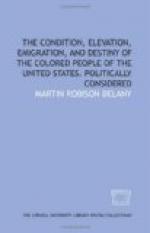The legitimate requirement, politically considered, necessary to the justifiable claims for protection and full enjoyment of all the rights and privileges of an unqualified freeman, in all democratic countries is, that each person so endowed, shall have made contributions and investments in the country. Where there is no investment there can be but little interest; hence an adopted citizen is required to reside a sufficient length of time, to form an attachment and establish some interest in the country of his adoption, before he can rightfully lay any claims to citizenship. The pioneer who leads in the discovery or settlement of a country, as the first act to establish a right therein, erects a building of whatever dimensions, and seizes upon a portion of the soil. The soldier, who braves the dangers of the battle-field, in defence of his country’s rights, and the toiling laborer and husbandman, who cuts down and removes the forest, levels and constructs post-roads and other public highways—the mechanic, who constructs and builds up houses, villages, towns, and cities, for the conveniency of inhabitants—the farmer, who cultivates the soil for the production of breadstuffs and forage, as food and feed for man and beast—all of these are among the first people of a democratic state, whose claims are legitimate as freemen of the commonwealth. A freeman in a political sense, is a citizen of unrestricted rights in the state, being eligible to the highest position known to their civil code. They are the preferred persons in whom may be invested the highest privileges, and to whom may be entrusted fundamentally the most sacred rights of the country; because, having made the greatest investments, they necessarily have the greatest interests; and consequently, are the safest hands into which to place so high and sacred a trust. Their interest being the country’s, and the interest of the country being the interest of the people; therefore, the protection of their own interests necessarily protects the interests of the whole country and people. It is this simple but great principle of primitive rights, that forms the fundamental basis of citizenship in all free countries, and it is upon this principle, that the rights of the colored man in this country to citizenship are fixed.
The object of this volume is, to enlighten the minds of a large class of readers upon a subject with which they are unacquainted, expressed in comprehensible language, therefore we have studiously avoided using political and legal phrases, that would serve more to perplex than inform them. To talk about the barons, King John, and the Magna Charta, would be foreign to a work like this, and only destroy the interest that otherwise might be elicited in the subject. Our desire is, to arrest the attention of the American people in general, and the colored people in particular, to great truths as heretofore but little thought of. What claims then have colored men, based upon the principles set forth, as fundamentally entitled to citizenship? Let the living records of history answer the enquiry.




